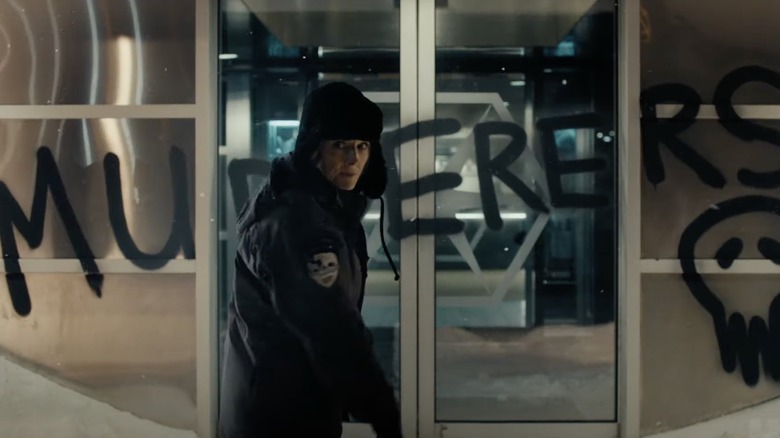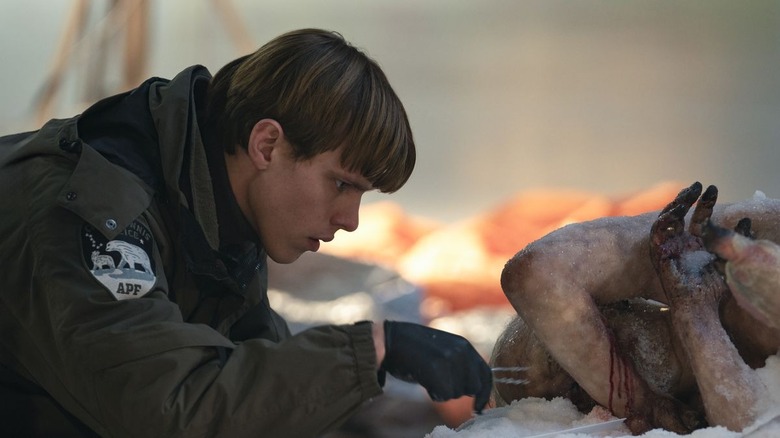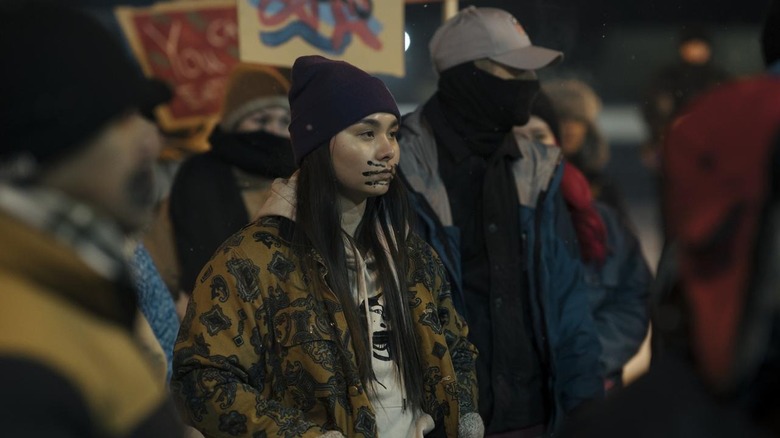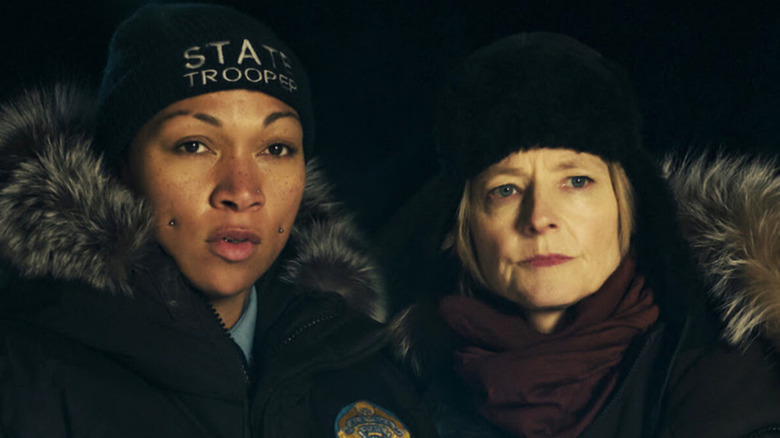The True Detective: Night Country Finale Reminds Us Don't Trust The Police
This article contains major spoilers for the finale of "True Detective: Night Country."
In 2019, the American Civil Liberties Union (ACLU) accused the police in Nome, Alaska of "a systemic and disastrous failure" to protect Native women. The accusation came in the aftermath of the rape of an Inupiaq woman named Clarice Hardy, a case she claimed was not investigated thoroughly by law enforcement. The accusation came less than two weeks after an AP investigation was released following multiple complaints from Alaska Native women from Nome and the surrounding villages, all claiming that their reports of sexual assault were not "investigated aggressively."
A cursory Google search will bring similar reports from Indigenous communities across the globe. The National Crime Information Center reported that, in 2016, there were 5,712 reports of missing American Indian and Alaska Native women and girls. However, the US Department of Justice's federal missing person database, NamUs, only logged 116 cases (via Native Hope).
This is to say that law enforcement agencies royally suck at serving and protecting Indigenous communities — especially women.
Issa López took a wild swing with "True Detective: Night Country," taking Nic Pizzolatto's groundbreaking series and delivering what many, including /Film's own Chris Evangelista, are calling the best season since the very first. While season 1 was set in sunny, sweaty southern Louisiana, season 4 is in the Alaskan tundra during the time of year when the area is cloaked in darkness for weeks. Additionally, the season pivots away from the troubled masculinity of Woody Harrelson's Martin Hart and Matthew McConaughey's Rustin Cohle to the scorned femininity of Jodie Foster's Liz Danvers and Kali Reis' Evangeline Navarro.
It's also a show that has no problem painting law enforcement as useless at best and murderously corrupt at worst.
Subverting the tropes of copaganda
At the core of "Night Country" is a mystery surrounding a "corpsicle," a bit of frozen body horror where a group of male researchers were all found naked and frozen in a pile with varying looks of terror on each of their faces. How did they get out there? Why are they naked? And what were they so afraid of before they died? But that's not the only mystery of Ennis, Alaska. There's also the unsolved murder of Annie K., an Indigenous woman who was found with 32 star-shaped stab wounds six years ago, although her tongue was found in the research facility where the corpsicle boys worked the same night as their disappearance. It's now up to law enforcement to figure out what happened.
The entertainment industry at large, but predominantly in America, has a serious copaganda problem. TV shows warp the public's perception of how the criminal justice system actually works, and often (even if inadvertently) perpetuate misleading narratives surrounding crime and violence. These misconceptions are so prominent that it has inspired folks like "Law & Order: SVU" star Mariska Hargitay to start the "End the Backlog" program through her Joyful Hearts Foundation, a national nonprofit looking to end the ridiculously large backlog of untested rape kits in America because real victims deserve the same attention and brevity to their cases as those shown on TV. "True Detective: Night Country" is centered a bit more in the realm of reality, which has led some viewers to complain about the show's lack of investigation and detective work.
Well, I hate to break it to you, but the police do not spend the majority of their time dealing with investigations of violent crime.
We keep us safe
The season finale of "True Detective: Night Country" provides both the truth of what happened to the researchers that became the corpsicle, as well as what happened to Annie K. After realizing the research facility was intentionally polluting the area, effectively poisoning and causing the deaths of the Indigenous community, Annie was going to blow the whistle on their whole operation. The researchers then killed her to protect themselves, and for six years, looked as if they had gotten away with murder. That is, until the Indigenous women hired to clean their facility uncovered the truth, and decided to take matters into their own hands.
The women held up the researchers at gunpoint, forced them into a truck, drove them out to the middle of nowhere, forced them to strip naked, and sent them running into the tundra where they all froze to death in a state of abject terror. The reason being — these women knew that they could not trust or depend on the police to be of any help to them. In movies and television, this sort of behavior is often lumped under the umbrella of vigilantism and typically associated with individual vigilantes or small syndicates. They're often superheroes like Batman, "good guys with a gun" tropes like Dr. Paul Kersey in "Death Wish," or any number of the women who dominate the rape-revenge subgenre.
In reality, it looks a lot more like the cleaning women, who seem to be operating under the face-value principles of "we keep us safe." By definition, "we keep us safe" is related to practices of restorative justice as an alternative to our current culture of punitive-based punishment, and the mantra of "we keep us safe" is also a rallying cry for abolitionists speaking out against the systemic abuse of law enforcement. The idea is that if the police aren't going to keep people safe, communities will by working together. However, "Night Country" distorts this belief system into an act of violence from these women, as if the show heard "we keep us safe" at protests and used that to formulate a "justified revenge" tale. Working outside the practice is presented as effective, in the same way the series encourages the idea that the only good cops are ones working outside their own practices.
A just exception that proves the rule
When Chief Danvers and Trooper Navarro finally figure out the truth of what happened, they approach the women to discuss, and they are told a story that sounds like a legend passed through oral traditions. Meanwhile, the episode shows us the truth of their communal justice. Danvers and Navarro know that the women killed these men but with a so-called expert analyst already claiming the men died of hypothermia during an avalanche, the officers decide to run with this narrative. At the same time, these women also cover for Officer Peter Prior who shot his father, fellow Officer Hank Prior after he threatened Danvers' life and admitted to being responsible for moving the body of Annie K. In both scenarios, Danvers and Navarro are willingly covering up murders because it's the "right" thing to do.
We know that Hank was a royal P.O.S. and that the research scientists got what was coming to them, but Danvers and Navarro doing the right thing also means ... not doing their jobs as officers of the law. They perpetuate something we see constantly in film and TV, that the best cops are those who break the rules and operate outside of the justice system. What does it say about the state of policing when they only way to achieve true justice is to not follow orders? "Night Country" shows multiple officers taking matters into their own hands, and we're lucky that Danvers and Navarro were the ones that came out on top. But what if they hadn't? What if Hank was the cop working outside of the system that had been the one to get away with his plans?
There's no way for us to know, which is a good enough reminder as always to never trust the police.
[This article has been updated for clarity.]



